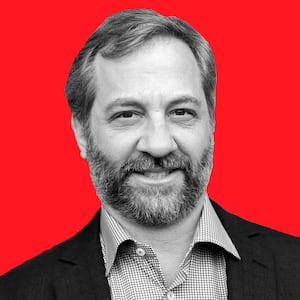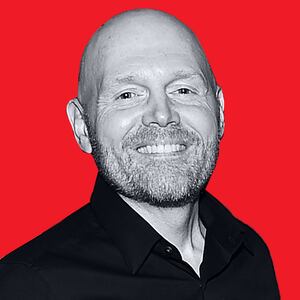When comedian Shane Gillis was hired and then quickly fired by Saturday Night Live back in September, most of the conversation surrounded the anti-Asian slurs he had expressed on his podcast. But there was a lot more where that came from.
As first reported by Vulture’s Megh Wright, Gillis and his podcast partner Matt McCusker also shared a special disdain for more sensitive or confessional comedians, singling out Chris Gethard, who put out an HBO special called Career Suicide about suffering from depression, and Judd Apatow, who has been an outspoken critic of other male comics like Bill Cosby and Louis C.K. who have used their status to prey on women. According to Gillis, this made them “white faggot comics” and “fucking gayer than ISIS.”
Despite being a prolific Twitter user, Apatow deliberately stayed out of the fray at the time, posting just one tweet in response to those reports: “I don’t mind but I think ISIS probably feels bad about this,” he joked.
On this week’s episode of The Last Laugh podcast, he weighs in at length for the first time.
“There’s such a debate happening about what’s appropriate and what’s inappropriate in comedy,” Apatow tells me. “And I feel bad for everybody, I really do. I feel like comedians generally have very good intentions. And even the ones who are doing things that people are debating, they really are trying to make people happy and make a living.”
“There’s just so much pain around this issue and it’s made me sad to see divisions build up in the comedy world over this,” he adds, alluding to the so-called comedy “civil war,” a notion popularized by a recent article in The Hollywood Reporter that has been roundly mocked by comedians since its publication.
“I think there are people who feel that their livelihoods are at stake and they feel in danger when they do their sets,” Apatow says. But at the same time, he believes it’s “not that hard to be aware of what you’re saying on stage and the effect of it” and that “some people feel like they can’t speak up when they’re offended or hurt or have to share stages with certain people.”
“I understand from both sides,” he continues. “So my heart is just a little broken about the fissure that’s happening. I have great compassion for both sides. So when this came up, I just made a choice to mainly sit it out. It also felt like such a storm was happening, it certainly didn’t need my commentary about it.”
Since he wasn’t previously familiar with Gillis’ comedy, Apatow says, “I didn’t know his level of sincerity.” As part of his defense, Gillis claimed he was “doing a character,” but Apatow said he had no way of knowing whether that was true. “I don’t have the information, because he’s new to me, to have an opinion about what he’s going for with any of his work,” he says. “So I felt uneducated about it.”
As for SNL’s decision to rescind Gillis’ offer, Apatow says, “I generally think that any employer has the right to decide who they want in their workspace.”
“A lot of people talk about it just as ‘cancel culture,’” he adds, but he acknowledges it’s a lot more complicated in practice. “I’m not in those meetings where they talk to him to try to get a sense of who he is and what he’s going for,” Apatow says. “So I can’t really speak to, did they cave to pressure or make a choice on their own morals and values?”
“I know we all have to make choices about who we want to share space with,” Apatow says, comparing it to when he’s had to assemble a writers’ room for one of his television shows. “I’m very aware that I want everyone to get along and like each other and feel safe to split open their unconscious.”
In those comedy writers’ room, Apatow explains, “you are usually told that you’re allowed to just let it spill. Because we’re trying to see what bubbles up. And part of that process is to just babble and let things fly.”
Rather than being a “safe space,” Apatow calls writers’ rooms a “rough space” for those who are easily offended by jokes. “It is not for the faint of heart or the thin-skinned,” he says. “And I think people are debating how far should that go? But a lot of comedians want the ability to do that on stage in front of paying customers.” For the most part, he thinks they “should be allowed” to do that, but they have to know audiences are allowed to criticize them if they do.
“I’m not sure who’s getting in trouble,” he says of so-called cancel culture. “I’m not sure what the list is of people who are getting in trouble that has led to such a level of fear. Most of the people who are talking about their fear are doing great.” Comics like Dave Chappelle and previous Last Laugh guest Bill Burr love to complain about political correctness on stage but are among the most successful comedians working right now, in no real danger of being “canceled.”
Apatow acknowledges that “there are a lot of people looking for you to slip up or looking to be offended” by what a comedian says on stage. “And that’s a hard place to be if you have the type of act that wants to kick around more difficult ideas, that wants to ruffle feathers, that wants to examine things that people have trouble talking about and getting along.”
Naturally, this brings us to the topic of Louis C.K., who just this past weekend launched his big “comeback” tour in Virginia. Ever since he was exposed for sexually harassing several female comedians, C.K. has pivoted towards material that seems designed to appeal to a more conservative audience. That was apparent most prominently in his bit about the Parkland school shooting survivors that leaked last year.
“They testify in front of Congress, these kids? What are they doing?” C.K. said on stage at a Long Island comedy club in December 2018. “You’re young, you should be crazy, you should be unhinged, not in a suit… you’re not interesting. Because you went to a high school where kids got shot? Why does that mean I have to listen to you?… You didn’t get shot, you pushed some fat kid in the way, and now I’ve gotta listen to you talking?”
In response, Apatow tweeted, “This hacky, unfunny, shallow routine is just a symptom of how people are afraid to feel empathy. It’s much easier to laugh at our most vulnerable than to look at their pain directly & show them love and concern. Louis CK is all fear and bitterness now. He can’t look inward.”
As Apatow tells me, he is particularly “sensitive” to the issue of mass shootings after a gunman shot and killed two women at a screening of his movie Trainwreck in 2015. “I don’t think people should talk about it recklessly,” he says. “They are allowed to and I don’t think anybody should be boycotted or not be allowed to work at a club if they make a terrible joke about it.” But he did find C.K.’s jokes “especially offensive, because those were underage kids and they have suffered in a way that no one can ever understand.”
Similarly, Apatow is disappointed that C.K. has not used his platform to address his sexual misconduct transgressions in any meaningful way. In his thoughtful review of C.K.’s new tour, The New York Times’ Jason Zinoman writes, “Those looking for any apologetic notes or reckoning with the damage he has done will be disappointed. He is not aiming for redemption onstage. If anything, he’s doubling down on the comedic value of saying the wrong thing.”
C.K.’s approach stands in sharp contrast to that of Aziz Ansari, who opened his latest Netflix special by somberly addressing the pain that he caused a woman who accused him of misconduct and saying that he hopes the experience has made him a “better person.”
“I appreciate what Aziz did and a lot of us feel like, we wish Louis said that on day one,” Apatow says. “And why wouldn’t you say it? Why wouldn’t you say, ‘I hope people feel better, I’m trying to learn, I hope something good comes from this, I don’t want people to be in pain.’ It seems like the natural thing to say.”
Instead, Louis C.K. has made jokes like this excusing his behavior: “I like to jerk off, and I don’t like being alone.” He was slightly more self-effacing when he addressed the backlash to his Parkland jokes. “If you ever need people to forget that you jerked off,” he said, “what you do is you make a joke about kids that got shot.”
“I don’t know what he’s thinking,” Apatow says. “But he’s also made a point of not really telling people what he’s thinking. And when he doesn’t, it creates this vacuum and everyone has to try to debate it to figure out what he’s thinking. So that’s why there’s so much debate, because he’s not saying, ‘This is what I took from this experience.’”
“And you know what? He will,” Apatow continues. “One day, we’ll hear it.”
Next week on The Last Laugh podcast: Stand-up comedian and star of Curb Your Enthusiasm and The Goldbergs, Jeff Garlin.



